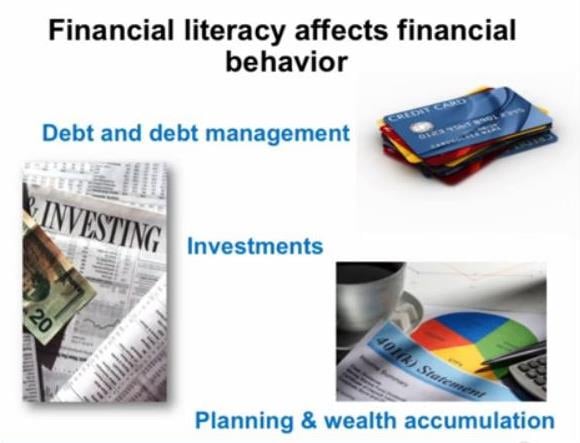It’s easy to become complacent about our finances with the vast number of websites, apps, and businesses available today that specialize in helping people manage their money. Granted, technology can be a powerful partner in financial management, but it cannot replace a strong understanding of factors that should inform decisions about how, where, and when we spend our money.
Why is financial literacy more important than ever?
Our financial landscape has grown increasingly complex. Before a young person approaches college or a career, he or she is faced with big decisions on how much money to borrow for tuition, how much to save, how to invest, and how to grow and protect their budding wealth.
Dr. Annamaria Lusardi, a professor of economics and accountancy at the George Washington School of Business, wanted to test how financially literate populations are, both in the United States and internationally. What she found was surprising. She discussed her research recently at a TEDx Foggy Bottom gathering.
Basic questions about interest rates, inflation, and risk diversification
Dr. Lusardi’s research study asked three basic questions about interest rates, inflation, and risk diversification:
- Suppose you had $100 in a savings account and the interest rate was 2% per year. After 5 years, how much do you think you would have in the account if you left the money to grow?
- Imagine that the interest rate on your savings account was 1% per year and inflation was 2% per year. After 1 year, with the money in this account, would you be able to buy more than today, less than today, or exactly the same amount as today?
- Do you think the following statement about risk diversification is true or false? ‘Buying a single company stock usually provides a safer return than a stock mutual fund.’
On the whole, these questions were answered correctly; 65% correctly answered the question about interest rates, 64% correctly answered the question about inflation, and 52% correctly answered the question about risk diversification.
However, approximately 1 in 5 Americans answered the same questions about interest rates and inflation incorrectly. Nearly 35% of Americans chose to avoid the question about risk diversification altogether, and submitted a response of “I don’t know.”
Only 30% of American respondents were able to answer all three questions correctly.
How do American statistics compare to international data for the same study?
Dr. Lusardi found that responses were similar in the eleven other countries she surveyed. In particular, the question about risk diversification seemed to stump people around the world.
Perhaps most troubling, however, was the finding that women were much more likely to answer a question with “I don’t know.” Nearly 50% of female American respondents responded as such to the question about risk diversification.
The gender gap didn’t close in Dr. Lusardi’s research, regardless of female respondents’ age or level of education. Across the board, close to half of female respondents submitted “I don’t know” at least once in the question set.
So what?
People with low financial literacy are more likely to have problems with debt, don’t take advantage of opportunities offered by financial markets, don’t plan for retirement, and are less likely to to accumulate wealth throughout their lives. Dr. Lusardi points out that a population’s level of financial literacy has a ripple effect and a direct societal impact.
Lessons on money management can begin with an exercise in budgeting, and then be expanded into a more comprehensive unit that includes concepts like investing, managing debt, and understanding credit reports. Financial fundamentals can be incorporated into elementary and secondary classrooms alike.
What techniques and resources do you use to increase your students’ financial literacy?


